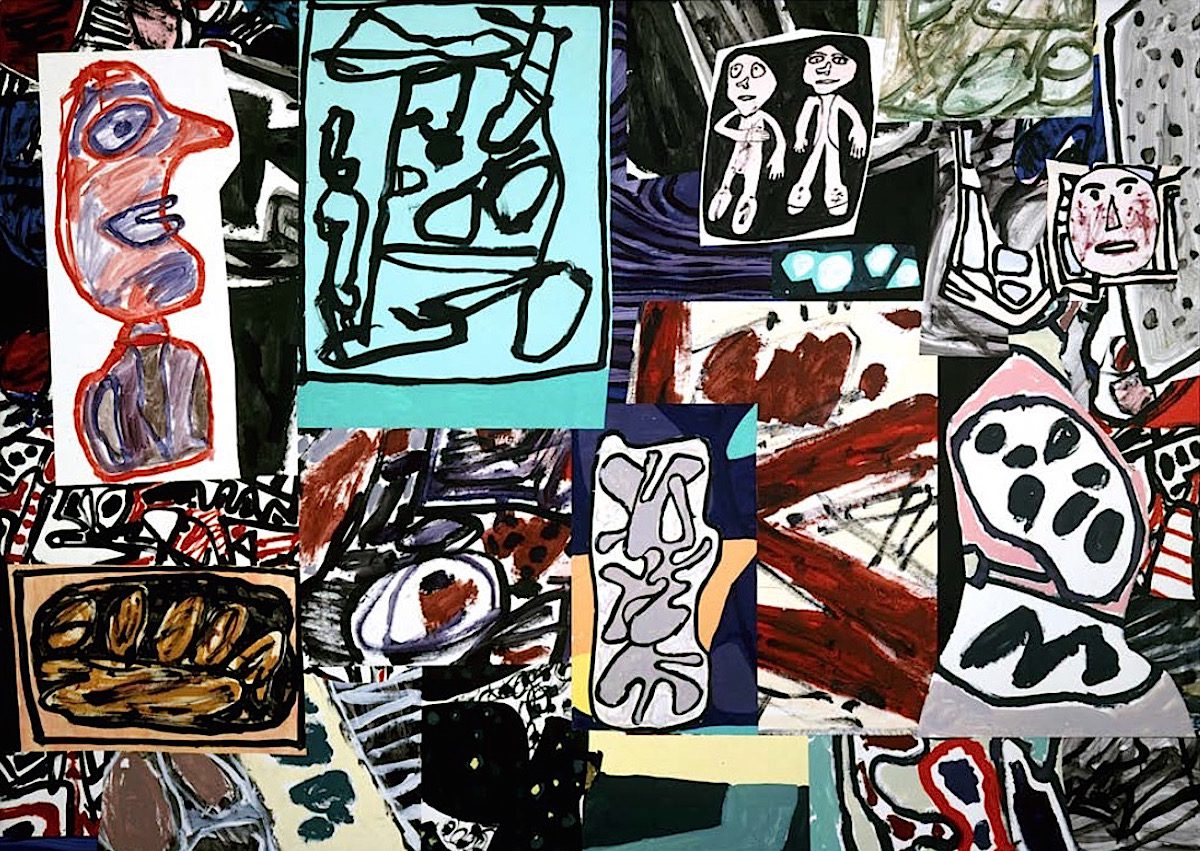The first exhibition of Jean Dubuffet’s Théâtres de mémoire series in over three decades will be unveiled at Pace London. This will also be the first-ever exhibition dedicated to the series in London. Curated by Arne Glimcher, the founder of Pace Gallery, and Tamara Corm, Senior Director at Pace London, this exhibition features eight monumental paintings on loan from Fondation Dubuffet and significant British and European institutions. Most of the works have never been seen in the UK before, including Les données de l’instant (1977), Dramatisations (1978), Les commentaires (1978), and Vestiges et devenirs (1976). Jean Dubuffet: Théâtres de mémoire is on view from 13 September to 21 October 2017 at 6 Burlington Gardens.
The Théâtres de mémoire is one of Dubuffet’s most important series of works and contains some of the largest paintings he has ever made. The series, which Dubuffet started at age 74, also marks one of the last he created. The gigantic collages are composed of overlapping papers, layer upon layer, where he tested their placement by moving the elements, adding, rearranging, and deleting images until an eventual perfect coalescence of the interlocking parts was achieved. This was a new technique for the artist and a redefinition of his art.
Each work is a vast picture made up of smaller paintings, which Dubuffet cut out and glued to the canvas. He began his process on his studio floor, where he would arrange different combinations of cut-out figures and scenes. He then used magnets to pin the paper or canvas to the wall, allowing him to easily replace one element with another, and to overlap segments until he reached his final compositions. These are the paintings that first interested Jean-Michel Basquiat, who regularly visited the gallery to see any new arrival by Dubuffet.
The paintings depict abstractions, landscapes, scribbles, and figures from Dubuffet’s mind. Dubuffet titled the series after Frances Yates’ book The Art of Memory, which presents the ‘memory techniques’ used by Cicero and orators in the Middle Ages that enabled them to remember storehouses of knowledge. For Dubuffet, each of the Théâtres de mémoire is a collection of actual places and scenes that crowd and conflict in our memory. Just as memories are hazy and incoherent, the compositions have no clear narrative or starting point. In Dramatisation (1978) for example, Dubuffet brings together 42-elements to create an energetic assemblage of large and small figures and abstractions. Dubuffet requires the viewers to participate in this frenzy of visual information, and asks them to get lost in contemplation and experience, in Dubuffet’s words, “viewing by the mind, not the eyes”.
Jean Dubuffet (b. 1901, Le Havre, France; d. 1985, Paris) began painting at the age of seventeen and studied briefly at the Académie Julian, Paris. After seven years, he abandoned painting and became a wine merchant. It was not until 1942 that he began the work which has distinguished him as an outstanding innovator in post-war European painting. Dubuffet’s interest in art brut, the art of the institutionalised and the untrained, whether a Paleolithic cave artist or the writer of contemporary graffiti, led him to emulate this directly expressive and untutored style in his own work. His paintings from the early forties in brightly colored oils were soon followed by works in which he employed such unorthodox materials as cement, plaster, tar, and asphalt—scraped, carved and cut and drawn upon with a rudimentary, spontaneous line. Dubuffet’s oeuvre was propelled by a constant evolution of techniques, seeking to dislocate site, space, and established continuities. In 1966, he received three independent retrospectives at museums, including the Tate Gallery, London; Stedelijk Museum, Amsterdam; and Museum of Fine Arts, Dallas, which travelled to the Walker Art Center, Minneapolis. Jean Dubuffet has been represented by Pace since 1967.
Jean Dubuffet: Théâtres de mémoire 13 September – 21 October 2017 Pace London 6 Burlington Gardens, London W1S 3ET Free

